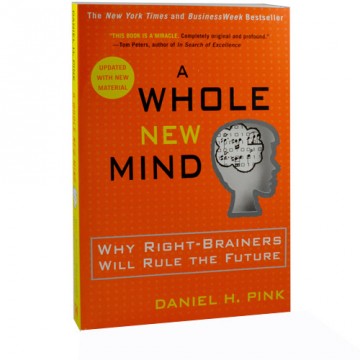“…and he has filled him with the Spirit of God, with skill, with intelligence, with knowledge, and with all craftsmanship” Exodus 35:31
As a Christian, I know that God is the Creator. As a follower of Christ, I am called to be creative. That is true even in the way I share the gospel. The gospel truth is the same yesterday, today, and tomorrow….my calling is to make my life and my story attractive to people in a way that will point them to Jesus. Daniel Pink’s book A Whole New Mind reminds us that our culture is in the midst of change. In order to truly impact people, you have to attract them first.
As an educator, this book is a great reminder that logic is still a critical skill…but creativity is a necessary component in getting your point across. This is the essence of 21st Century learning. I highlighted several things while reading and have pasted them below…
- We are moving from an economy and a society built on the logical, linear, computerlike capabilities of the Information Age to an economy and a society built on the inventive, big-picture capabilities of what’s rising in its place, the Conceptual Age.
- Our brains are divided into two hemispheres. The left hemisphere is sequential, logical, and analytical. The right hemisphere is nonlinear, intuitive, and holistic.
- Left-brain-style thinking used to be the driver and right-brain-style thinking the passenger. Now, R-Directed Thinking is suddenly grabbing the wheel, stepping on the gas, and determining where we’re going and how we’ll get there. L-Directed aptitudes–the sorts of things measured by the SAT and deployed by CPAs–are still necessary. But they’re no longer sufficient. Instead, the R-Directed aptitudes so often disdained and dismissed–artistry, empathy, taking the long view, pursuing the transcendent–will increasingly determine who soars and who stumbles.
- Mastery of design, empathy, play, and other seemingly “soft” aptitudes is now the main way for individuals and firms to stand out in a crowded marketplace.
- As Columbia University’s Andrew Delbanco puts it, “The most striking feature of contemporary culture is the unslaked craving for transcendence.”
- Outsourcing is overhyped in the short term. But it’s under hyped in the long term.
- Think of the last 150 years as a three-act drama. In Act 1, the Industrial Age, massive factories and efficient assembly lines powered the economy. In Act 2, the Information Age, the United States and other nations began to evolve. Now, as the forces of Abundance, Asia, and Automation deepen and intensify, the curtain is rising on Act 3. Call this act the Conceptual Age.
- In short, we’ve progressed from a society of farmers to a society of factory workers to a society of knowledge workers. And now we’re progressing yet again–to a society of creators and empathizers, of pattern recognizers and meaning makers.
- In a world tossed by Abundance, Asia, and Automation, in which L-Directed Thinking remains necessary but no longer sufficient, we must become proficient in R-Directed Thinking and master aptitudes that are high concept and high touch.
- I’ve distilled the answer to six specific high-concept and high-touch aptitudes that have become essential in this new era. I call these aptitudes “the six senses.” Design. Story. Symphony. Empathy. Play. Meaning.
- Not just function but also DESIGN.
Not just argument but also STORY.
Not just focus but also SYMPHONY.
Not just logic by also EMPATHY.
Not just seriousness but also PLAY.
Not just accumulation but also MEANING. - “Design is interdisciplinary. We’re producing people who can think holistically.” Clair Gallagher
- “Good design is a renaissance attitude that combines technology, cognitive science, human need, and beauty to produce something that the world didn’t know it was missing.” Paola Antonelli, curator of architecture and design, Museum of Modern Art
- “Aesthetics matter. Attractive things work better.” Don Norman, author and engineering professor
- The democratization of design has altered the competitive logic of businesses.
- “It’s not true that what is useful is beautiful. It is what is beautiful that is useful. Beauty can improve people’s way of life and thinking.” Anna Castelli Ferrieri, furniture designer
- “Humans are not ideally set up to understand logic; they are ideally set up to understand stories.” Roger C. Schank, cognitive scientist
- Symphonic thinking is a signature ability of composers and conductors, whose jobs involve corralling a diverse group of notes, instruments, and performers and producing a unified and pleasing sound.
- Empathy is an essential part of Design, because good designers put themselves in the mind of whoever is going to experience the product or service they’re designing.
- “Games are the most elevated form of investigation.” Albert Einstein
- “We are born for meaning, not pleasure, unless it is pleasure that is steeped in meaning.” Jacob Needleman
